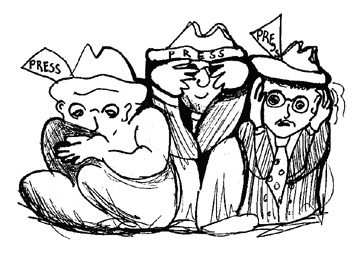Bias Watch
- In a Jan. 7 article, Seattle P-I business columnist Carol Smith categorized employees who commit workplace violence as psychotics, pathological blamers and those with impaired neurological functions or other mental disorders. Smith's articles also attributed the recent increase in workplace violence largely to the "tremendous restructuring of the workplace that has occurred over the last decade." Could she perhaps be speaking of layoffs, erosion of job security and benefits, declining standard of living, and the resulting disruption of families? Is it possible that more and more workers may simply be desperate, rather than mentally ill?
- Conservative foundations pumped $3.2 million into prominent right-wing publications from 1985 to 1990, and another $1.1 million into right-wing campus papers, while liberal progressive foundations gave only $165,000 in the same years to prominent left-wing papers, In These Times reported recently.
- A National Public Radio news report of Jan. 6 hinted that Rudolph Giuliani, the new Republican mayor of New York City, would be free to act more independently than former Democratic Mayor David Dinkins because Giuliani was elected "without the support of labor and other special interests." The report made no mention of Giuliani's corporate backing, which apparently in NPR's view is not a special interest.
New Ink
- It's upsetting, though not surprising, that we've come to need an alternative to the middle-drifting Utne Reader. But we're happy that it has arrived. It's called Alternative Press Review, a quarterly out of Missouri, of all places. APR's winter issue, its second, is an 84-page explosion of social, political and cultural goodies gleaned from mags and 'zines from all over the country. Beyond excerpted articles, it includes reviews of alternative mags and original pieces about where the alternative press is headed. (How many times can I get the word "alternative" in this blurb?!) One-year subs of APR are $16. They can be reached at PO Box 1446, Columbia, MO 65205-1446.
- A second women's journal has appeared on the scene (the first being Gaya). synapse is a mixed-media mag of poetry, photography, conversation, essays, short fiction, comics - even sheet music. Published quarterly by a women's collective, synapse is also doing readings and other events around town. Their second issue should be out soon. synapse can be reached at PO Box 95220, Seattle 98145-2220, (206) 524-1235. One-year subs are $10.
[Home]
[This Issue's Directory]
[WFP Index]
[WFP Back Issues]
[E-Mail WFP]
Contents on this page were published in the February/March, 1994 edition of the Washington Free
Press.
WFP, 1463 E. Republican #178, Seattle, WA -USA, 98112. -- WAfreepress@gmail.com
Copyright © 1994 WFP Collective, Inc.
 In the spirit of Project Censored's annual list of Top 10 censored news stories, here's the local equivalent, as compiled by The Free Press staff. You may recognize some of the stories from the pages of past Free Press editions. Others have been researched by us but have not been the subject of full-blown articles.
In the spirit of Project Censored's annual list of Top 10 censored news stories, here's the local equivalent, as compiled by The Free Press staff. You may recognize some of the stories from the pages of past Free Press editions. Others have been researched by us but have not been the subject of full-blown articles.




